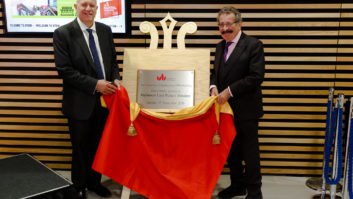
Firmly established as the UK’s largest integrator of AV, videoconferencing and digital media solutions, AVMI also continues to expand its global footprint through a comprehensive partner scheme. David Davies speaks to CEO Edward Cook about the ongoing rise of managed services and the next moves in the great AV/IT convergence.
Having joined the company some 15 years ago this February, Edward Cook is well placed to chart the phenomenal growth of AVMI as a worldwide player. Both through its dedicated International Business division and an extensive network of international partners, the company has consistently reinforced its position at the forefront of integration services. And with AV and IT technologies – and the relationship between them – evolving evermore rapidly, that’s no mean feat. All of these strands featured in Installation’s recent conversation with Cook, although the starting-point was a reflection on AVMI’s progress in the year to date…
In overall terms, how is 2016 shaping up for AVMI?
Everything is good for us at the moment. We are seeing a real demand coming through for our global activities and that is the area we have been focusing on. We continue to promote our managed services, which make up a very significant part of our business, both in terms of on-site engineering teams and off-site maintenance. We see great demand from the retail sector, but are also still getting great interest from the traditional City-based financial sector.
Managed services are integral to the AVMI business. How would you define your offers in this area, and what makes them unique?
Definitions are important when it comes to managed services. So for example, there are instances where we put teams on-site managing their AV services, all their video, and sometimes their multimedia – and we would call that a managed service. We have more than 150 staff permanently based with our clients, running those services, providing meeting room support, event management, content management and so on. We would estimate that we have one of the biggest teams [of this kind], if not the biggest, in the UK.
But also within the managed services definition we include content management and distribution. This is primarily for retailers, but also for high street banks where there is a need to get content to branches, and for corporates where there is a wish to display content in reception areas and so on. This is definitely a growing sector and one that we are keen to
play in.
AVMI is currently working with Microsoft to bring Surface Hub to its customers. In what ways do you think this solution is particularly significant and/or innovative?
We see it as a next-generation collaboration tool that at its most basic is an interactive touchscreen that has its own operating system and, for its own intents and purposes, its own PC. The groundbreaking aspect is in the collaborative aspect with features such as built-in dual cameras; very clever technology, which we think will make collaborative sessions work really well on a practical basis. It’s very much a multi-user solution, and it could be that it will take people a while to adjust to that. But once they have I think it will fly off the shelves.
With Surface Hub, we have established a team to support and configure it; there is an element of configuration due to the inclusion of Skype for Business and the fact it will sit on people’s networks. This team will champion the integration of Surface Hub, which we are expecting to become a bulk product.
Can you give us an idea of how the partner programme has evolved, and how it operates these days?
We continue to add to the scheme all the time and now have about 70 partners around the world, which is a huge number [to have amassed over the nine years that have elapsed] since we kicked off the partner route at the back-end of 2007. We have put a huge amount of effort into developing the programme, but what we are keen to do now is not to package it up as an entity in its own right; rather they are AVMI’s partners that we use and feel comfortable can deliver projects to the correct standard and support clients in their own territories. We cover every state in the US and have multiple partners in all major territories – we find some are better than others in different aspects. Similarly, some clients want to be able to use their own local partners that they have tested and have a relationship with. Our partner programme allows us to do all of that.
But if a partner is not able to perform, or is not responsive and communicative, then they won’t be a partner for very long. So it is flexible and changing.
To what extent do you think the current flurry of activity around standards will help the ongoing AV/IT convergence?
Anything that makes different suppliers’ equipment work together with others, assists the integrator and helps simplify things for the clients [is evidently to be welcomed]. So for example, we note projects like WebRTC [an API definition that supports browser-to-browser applications for voice calling etc] will very much help in the uptake of video services generally, and we are excited about that.
If manufacturers can sort out the standards, that is great and we appreciate it. Where the integrator needs to follow is in being able to offer standardised meeting room/collaboration space offerings for large corporations all over the world. So instead of having someone walk in and have, say, a Crestron interface in one room, and a Cisco or AMX in another room, it is more a case of: this is the standard look and feel, the GUI will be the same on whatever touchpanel you have, and ideally the equipment and functionality will be the same. Therefore, the role of the integrator will be to take the standardisation process global, and to do that you have to have both the resources and the reach.
For us it is driven by a demand from the clients for ease of use and standardisation, and in particular the ability to support technology in a standardised, documented way.
In terms of explaining standards, such as those now rising to prominence in audio, do you think there is still a long way to go in terms of educating the client?
Yes, I do, and in some ways it has probably got more difficult during the last five years. The reason for that is that the clients have changed; the companies are the same, but the people within them have changed. So responsibility has moved from the facilities managers to the IT departments, which means you move away from a client who was just starting to be educated in audio standards, for example, and the nuances of successful AV implementation – towards a client who knows nothing about that but who does know a huge amount about IT standardisation and methodologies, and what the end-game should look like. [Consequently] the AV industry does need to educate the client on that front, but also give them what they want – principally a set of technologies that fit within the standards and methodologies they have already spent years and years implementing.
Up until fairly recently, there was a general feeling that there was an insufficient amount of dialogue between AV and IT people – but is that still the case?
There is more dialogue now, but probably still not enough. I think we have seen a bit of a battle going on within the large corporates between the AV teams and the IT teams, and definitely in our view the IT teams have won. It may be that dedicated in-house AV people are still there, but are now most likely to be under an IT banner or an IT divisional head. Where AV people have moved into IT divisions you will now get that communication happening much more effectively. But where IT teams have won the battle and AV teams have [effectively] disappeared, there is a challenge for us as service providers to win around the IT teams. It is absolutely our task to realise that the clients are now IT people and we need to be able to talk their language, and not expect them to speak our language. And that is certainly what we are attempting to do at AVMI.
There has been a fair amount of fear [within the AV sector] that because clients are becoming much more IT-dominated, so will our industry. But in fact it is the AV industry that has the skillset the clients want, and it is our task – and opportunity – to raise our profile [as a sector] so that the client can find us and employ us to fulfil the requirements they have. If we don’t do this they will continue to do what they are doing now, and that is go to the big telco and IT integrators. But if the AV industry can lay out what it offers in front of people [in an effective way] there are massive contracts to be won and we can see our industry really maturing to be a mainstream player in the workplace.







